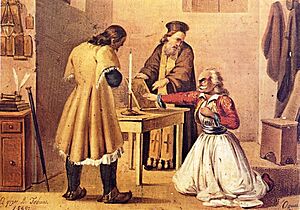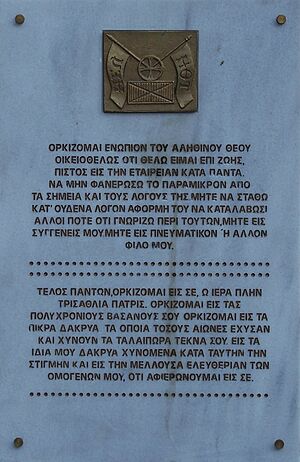Filiki Eteria facts for kids
|
Φιλική Εταιρεία
|
|
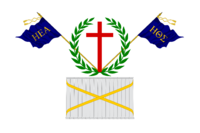
Insignia of the Filiki Eteria
|
|
| Formation | September 14, 1814 |
|---|---|
| Founder |
|
| Founded at | Odessa, Russian Empire |
| Type | Secret society Revolutionary organisation |
| Purpose | Instigate the Greek War of Independence
|
| Headquarters | Odessa Constantinople (from 1818) |
|
Region
|
Ottoman Empire
|
| Fields | Greek nationalism |
| Leader | Alexandros Ypsilantis |
|
Key people
|
|
The Filiki Eteria (which means "Society of Friends") was a secret group formed in 1814. It was created in a city called Odessa, which was part of the Russian Empire back then. The main goal of this secret society was to free Greece from the rule of the Ottoman Empire. They wanted Greece to become an independent country.
Members of the Filiki Eteria were mostly young Greeks. Many came from important families in Constantinople or from the Russian Empire. There were also local leaders and military figures from different parts of Greece. Even some Christian leaders from other countries under Greek influence, like Serbia and Romania, joined. A very important leader of the group was Prince Alexander Ypsilantis. The Filiki Eteria played a huge role in starting the Greek War of Independence in the spring of 1821.
Contents
How the Society Started
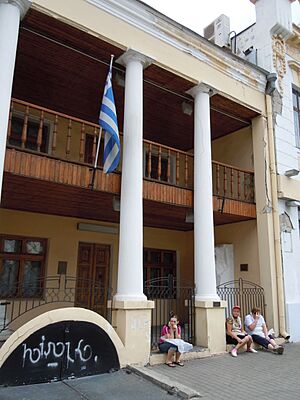
Many Greeks really wanted to be free from Turkish rule. They were inspired by other secret societies in Europe. So, in 1814, three Greeks met in Odessa. They decided to create a secret group, similar to a Freemasonic lodge. Their aim was to unite all Greeks to fight and end Turkish rule.
The three founders were Nikolaos Skoufas from Arta, Emmanuil Xanthos from Patmos, and Athanasios Tsakalov from Ioannina. Soon after, they brought in a fourth member, Panagiotis Anagnostopoulos.
One of the founders, Skoufas, learned about a similar secret group called Carbonarism. Xanthos joined a Freemasonic group in Lefkada. Tsakalov was part of an earlier group called the Hellenoglosso Xenodocheio (meaning "Greek-speaking Hotel"). This group, founded in Paris, also worked to free Greece.
At first, between 1814 and 1816, there were only about twenty members. By 1817, the society started to grow. They brought in Greeks living in Russia and in the Danubian Principalities (parts of modern-day Romania). Even the Prince of Moldavia, Michael Soutzos, became a member.
The group really started to grow quickly in 1818. By early 1821, the Filiki Eteria had members all over Greece and in Greek communities abroad. Thousands of people had joined. Members included merchants, church leaders, and even some officials from the Ottoman Empire. Important figures like Theodoros Kolokotronis and Germanos of Patras were also members.
Secret Ranks and Oaths
The Filiki Eteria was very secret, like the Carbonari and Freemasons. The leaders made decisions and said they were from an "Invisible Authority." People thought this "Invisible Authority" was made up of powerful people, maybe even the Russian Tsar Alexander I. This made the society seem mysterious and important.
But actually, the "Invisible Authority" was just the three founders at first. Later, more people joined this top leadership group. By 1818, it was called the "Authority of the Twelve Apostles." Each "Apostle" was in charge of a different region.
The group had a pyramid-like structure, with the "Invisible Authority" at the very top. Members were not allowed to ask who created the group. They had to follow orders without question.
There were four levels of membership, like ranks:
- Brothers (or Vlamides)
- Recommended
- Priests
- Shepherds
The "Priests" were the ones who brought in new members.
When someone wanted to join, a "Priest" would first check if they loved their country. Then, the new member would take a long and serious oath, called the Great Oath.
I swear in the name of truth and justice, before the Supreme Being, to guard, by sacrificing my own life, and suffering the hardest toils, the mystery, which shall be explained to me and that I shall respond with the truth whatever I am asked.
The oath ended with a powerful promise to Greece:
Last of all, I swear by Thee, my sacred and suffering Country,— I swear by thy long-endured tortures,— I swear by the bitter tears which for so many centuries have been shed by thy unhappy children, by my own tears which I am pouring forth at this very moment,— I swear by the future liberty of my countrymen, that I consecrate myself wholly to thee; that hence forward thou shall be the cause and object of my thoughts, thy name the guide of my actions, and thy happiness the recompense of my labours.
After taking the oath, the new member was accepted. The "Priest" would then teach them secret signs to recognize other members. The lowest ranks, "Brothers" and "Recommended," didn't know the group's full plan for revolution. They only knew it was a society working for the good of the nation, with important people involved. This was done on purpose to keep members hopeful and to make it easier to get new people to join.
Important Members
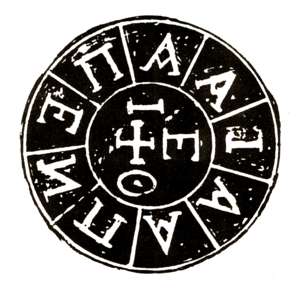
Members of the Filiki Eteria were divided into three main groups:
- Etairoi (society members), who had important jobs.
- Apostles (advocates), who also had important jobs.
- All other members.
Here are some of the key members:
| Etairoi | Apostles |
|---|---|
|
|
New Leadership and the Revolution
In 1818, the main office of the Filiki Eteria moved from Odessa to Constantinople. The death of one of the founders, Skoufas, was a big loss. The remaining founders tried to find a new, important person to lead the society. They wanted someone who would bring more respect and energy to the group.
In early 1818, they met with Ioannis Kapodistrias, who was a very important Greek diplomat. But he refused to lead the society. He even later said he thought the Filiki Eteria would cause trouble in Greece.
Finally, Alexandros Ypsilantis was asked to become the leader of the Filiki Eteria. He accepted in April 1820. He immediately started getting ready for a revolt. He even created a special military group called the Sacred Band.
The leaders discussed where to start the revolution. Some thought it should begin in Constantinople, the heart of the Ottoman Empire. But in the end, they decided to start in the Peloponnese (a region in Greece) and the Danubian Principalities (in modern-day Romania) at the same time. This was also a good time because many Ottoman forces were busy fighting against Ali Pasha of Ioannina.
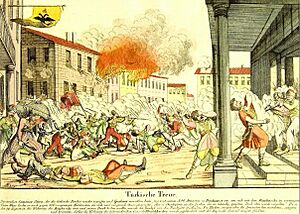
See also
- Ellinoglosso Xenodocheio
- Filomousos Eteria
 | Leon Lynch |
 | Milton P. Webster |
 | Ferdinand Smith |


